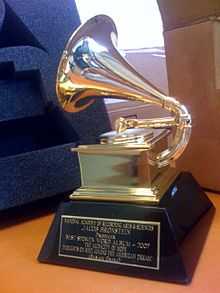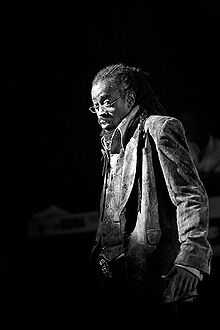Grammy Award for Best Reggae Album
| Grammy Award for Best Reggae Album | |
|---|---|
 Gilded gramophone trophy presented to Grammy Award winners | |
| Awarded for | quality reggae albums |
| Country | United States |
| Presented by | National Academy of Recording Arts and Sciences |
| First awarded | 1985 |
| Last awarded | 2014 |
| Official website | grammy.com |
The Grammy Award for Best Reggae Album is an award presented at the Grammy Awards, a ceremony that was established in 1958 and originally called the Gramophone Awards,[1] to recording artists for quality works in the reggae music genre. Honors in several categories are presented at the ceremony annually by the National Academy of Recording Arts and Sciences of the United States to "honor artistic achievement, technical proficiency and overall excellence in the recording industry, without regard to album sales or chart position".[2]
Originally called the Grammy Award for Best Reggae Recording, the honor was presented to artists for eligible songs or albums. The Jamaican group Black Uhuru received the first award in 1985. Beginning with the 1992 ceremony, the name of the award was changed to Best Reggae Album. Starting in 2002, awards were often presented to the engineers, mixers, and/or producers in addition to the performing artists. According to the category description guide for the 52nd Grammy Awards, eligible works are vocal or instrumental reggae albums "containing at least 51% playing time of newly recorded music", including roots reggae, dancehall and ska music.[3]
Stephen Marley holds the record for the most wins in this category, with six wins total (three times as a member of the band Ziggy Marley and the Melody Makers). Similarly, Ziggy Marley has been presented the award four times total, three times as the leader of his eponymous band. Bunny Wailer has received the award three times, and two-time recipients include Burning Spear, Damian Marley, and Shabba Ranks. Jamaican artists have been presented with the award more than any other nationality. Buju Banton's nomination for the 2010 award sparked controversy and protest from the Gay & Lesbian Alliance Against Defamation due to homophobic lyrics within his music.[4]
Recipients

.jpg)







^[I] Each year is linked to the article about the Grammy Awards held that year.
2010 controversy
.jpg)
Buju Banton's (real name Mark Anthony Myrie) nomination for the 2010 award sparked controversy and protest due to homophobic lyrics within his music.[4][33] Banton's most controversial song, released in 1988, is "Boom, Bye Bye", which "promote[s] the murder of gay men by shooting or burning".[34] Following the artist's nomination, the Gay & Lesbian Alliance Against Defamation and the Los Angeles Gay and Lesbian Center placed an advertisement in the Daily Variety encouraging Grammy officials to denounce music that "promotes or celebrates violence against any group of people".[4] The advertisement, which took the form of a letter signed by gay rights and civil rights activists, asserted that honoring Banton was awarding "extraordinary hateful work". The National Academy of Recording Arts and Sciences responded by insisting that artists are honored for quality music "regardless of politics". Banton has been quoted as saying that he sees "no end to the war" between himself and gay men.[4][35] The 2010 award was presented to Stephen Marley. Banton was nominated in 2011 for the album Before the Dawn.[31] Other reggae musicians that have been accused of promoting anti-gay lyrics include Beenie Man, Elephant Man, Vybz Kartel, Shabba Ranks and Sizzla.[36][37]
See also
- List of Grammy Award categories
- List of reggae musicians
- List of roots reggae artists
- List of ska musicians
- Music of Jamaica
- Reggae genres
References
- General
- "Past Winners Search". National Academy of Recording Arts and Sciences. Retrieved March 4, 2011. Note: User must select the "Reggae" category as the genre under the search feature.
- Specific
- ↑ "Grammy Awards at a Glance". Los Angeles Times (Tribune Company). Retrieved April 24, 2010.
- ↑ "Overview". National Academy of Recording Arts and Sciences. Retrieved April 24, 2010.
- ↑ "52nd OEP Category Description Guide" (PDF). National Academy of Recording Arts and Sciences. p. 5. Retrieved November 16, 2010.
- ↑ 4.0 4.1 4.2 4.3 Serjeant, Jill (January 29, 2010). "Gay groups urge Grammys to denounce Buju Banton". Reuters. Retrieved November 27, 2010.
- ↑ "Nominations Listed by Categories for 27th Annual Grammy Awards". Schenectady Gazette (Schenectady, New York). January 12, 1985. Retrieved June 21, 2010.
- ↑ Hunt, Dennis (January 15, 1988). "U2, Jackson Top Grammy Nominees". Los Angeles Times (Tribune Company). p. 5. Retrieved June 22, 2010.
- ↑ Hunt, Dennis (January 9, 1987). "Grammy Nominations: Highs And Lows". Los Angeles Times (Tribune Company). p. 5. Retrieved June 22, 2010.
- ↑ "Grammy Nominations". The San Diego Union-Tribune. January 15, 1988. Retrieved November 27, 2010.
- ↑ Hunt, Dennis (January 13, 1989). "Chapman, McFerrin Lead Grammy Race: Baker, Sting, Michael, Winwood Also Capture Multiple Nominations". Los Angeles Times (Tribune Company). p. 6. Retrieved November 27, 2010.
- ↑ Silverman, David (January 12, 1990). "Grammy Nominations Break With Tradition". Chicago Tribune (Tribune Company). p. 3. Retrieved June 24, 2010.
- ↑ "List of Grammy nominations". Times-News (Hendersonville, North Carolina: The New York Times Company). January 11, 1991. Retrieved June 24, 2010.
- ↑ "34th Grammy Awards – 1992". Rock on the Net. Retrieved November 27, 2010.
- ↑ "35th Grammy Awards – 1993". Rock on the Net. Retrieved November 27, 2010.
- ↑ "36th Grammy Awards – 1994". Rock on the Net. Retrieved June 22, 2010.
- ↑ "The 37th Grammy Nominations". Los Angeles Times (Tribune Company). January 6, 1995. p. 7. Retrieved November 27, 2010.
- ↑ "List of Grammy nominees". CNN. January 4, 1996. Retrieved June 21, 2010.
- ↑ "The Complete List of Nominees". Los Angeles Times (Tribune Company). January 8, 1997. p. 7. Retrieved November 27, 2010.
- ↑ "Complete list of Grammy nominations". USA Today (Gannett Company). Retrieved November 27, 2010.
- ↑ "41st Grammy Awards – 1999". Rock on the Net. Retrieved November 27, 2010.
- ↑ "And the nominees are...". USA Today (Gannett Company). February 22, 2000. Retrieved November 27, 2010.
- ↑ McCallister, Jared (January 28, 2001). "Air Jamaica Flying to Trinidad". Daily News (New York City, New York: Mortimer Zuckerman). Retrieved June 21, 2010.
- ↑ "Complete List Of Grammy Nominees". CBS News. January 4, 2002. Retrieved June 21, 2010.
- ↑ "Complete list of Grammy nominees; ceremony set for Feb. 23". San Francisco Chronicle. January 8, 2003. p. 4. Retrieved June 22, 2010.
- ↑ "46th Grammy Awards – 2004". Rock on the Net. Retrieved January 17, 2011.
- ↑ "47th Grammy Awards – 2005". Rock on the Net. Retrieved January 17, 2011.
- ↑ "Blues, Folk, Reggae and World Music Nominees and Winners". Los Angeles Times (Tribune Company). Retrieved June 22, 2010.
- ↑ "49th Annual Grammy Awards Winners List". National Academy of Recording Arts and Sciences. Retrieved June 22, 2010.
- ↑ "50th annual Grammy Awards nominations (part II)". Variety (Reed Business Information). December 6, 2007. Retrieved June 22, 2010.
- ↑ "The 51st Annual Grammy Awards Winners List". National Academy of Recording Arts and Sciences. Retrieved June 22, 2010.
- ↑ "The 52nd Annual Grammy Awards Nominees List". National Academy of Recording Arts and Sciences. Retrieved June 22, 2010.
- ↑ 31.0 31.1 "53rd Annual Grammy Awards nominees list". Los Angeles Times (Tribune Company). Retrieved December 2, 2010.
- ↑ [List of 2013 nominees http://www.grammy.com/nominees]
- ↑ Brown, August (January 29, 2010). "Buju Banton's Grammy nomination angers gay rights groups". Los Angeles Times (Tribune Company). Retrieved November 27, 2010.
- ↑ Furse, Jane H. (December 14, 2009). "Grammy-nominated Jamaican reggae star Buju Banton faces 20 years after 11-pound cocaine bust". Daily News (New York City, New York: Mortimer Zuckerman). Retrieved November 27, 2010.
- ↑ "Grammy Doesn't Honor Buju Banton". The Advocate (Here Media). January 31, 2010. Retrieved November 27, 2010.
- ↑ "Beenie Man concerts cancelled over anti-gay lyrics". CBC News. August 27, 2004. Retrieved January 17, 2011.
- ↑ Adebayo, Dotun (October 18, 2002). "Don't blame the music". The Guardian (London: Guardian Media Group). Retrieved January 17, 2011.
External links
| ||||||||||||||